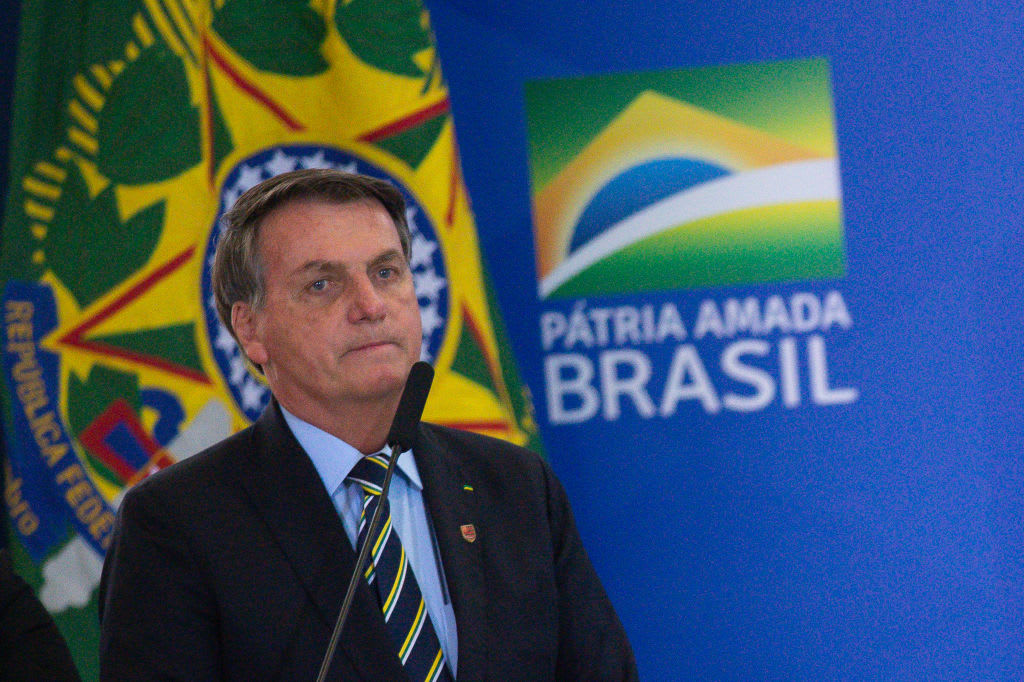Brazilian President Jair Bolsonaro
Brazil under his leadership

Since the colonial era, Brazil has been a regional power of South America. With plenty of natural resources and immense land size for agricultural production, it isn't a surprise to see how Brazil earned this title. But in recent years, Brazil became a poster child of absolute recklessness. Corruption and economic crimes spread across the country like a tidal wave. To understand how this came to pass, we must take a look at Brazil's recent history.
Ever since the fall of the Junta (military dictatorship), Brazil has been reorganizing itself immensely. The country initiated a number of reforms to pull itself out from the swamp of authoritarian rule and joined the line of democratic nations. Since then, Brazil was able to pull up its bootstraps and become a noticeable global player in trade and commerce.
Brazil's economic and political rebirth and prosperity came to an unfortunate end with the rise of the PT (Partido de los Trabajadores) - a left-wing federal party. In 2002 the top PT politician Luiz Inácio Lula da Silva was elected President of Brazil. Initially, his reign was beneficial to the country, but that changed. Within his later term, widespread federal corruption ran rampant across the country. It depleted its economic prosperity and the coffers of Petrobras - a once promised golden child in the Brazilian oil and gas sector. In fact, the corruption became so bad that major companies became the source of fiscal enrichment in bribery cases for compromised politicians of all levels of government. Lula, himself, became extremely financially wealthy and acquired lots of property. After it had all been said and done, Brazil became one of the most corrupt countries in the world.
It wasn't until 2014 when Operation Car Wash came into effect. Arrests, convictions and nine suits against Silva were the results of an lengthy, ongoing investigation against him and his federal party. In the end, he was found guilty of corruption and money laundering and was sentenced to twelve years in prison. Even his successor, Dilma Rousseff, was also found to have ties to severe corruption and was subsequently impeached and stripped of her title.
The Brazilian 2018 election saw the rise of member of the chamber of deputies, Jair Bolsonaro. His staunch opposition to secularism, homosexuality, affirmative action, abortion and same-sex marriage and supporter of national conservatism makes him a direct opposite of the PT. In fact, many observers call Bolsonaro a far-right populist for his views. He was even called "The Donald Trump of the South". In Brazil, it takes a party from the other side of the political spectrum to make considerable headway in the election poles and turn the tide. To get rid of one radical political faction, an opposing radical faction has the power to take its place. In this election there was no middle ground. No moderate party and candidate had the means to gain any ground. On January 1, 2019, Bolsonaro assumed the office of President of Brazil.
It didn't take long for a controversial man like him to gain unsavory attention. His promise to allow everyone to have a firearm as protection hasn't sit well with many. But the most infamous event that spurred international outrage was the sanctioned burning of the Amazon jungle. This move doesn't surprise me, considering his undeniably vocal antagonism towards climate change and environmentalism. Known as "the lungs of the world" Bolsonaro allowed swaths of the jungle to be burned for agricultural expansion. Not only does this irrefutably destroy an extremely sensitive ecosystem, but also directly endangers groups of aboriginal tribes deep within the jungle. Some of these tribes haven't even had any contact with the western world. In a defiant act that will remove any protection for the aboriginals, Bolsonaro decided to remove any regulations that sought to keep them safe from harm.
Brazil will undergo further drastic changes under Bolsonaro's leadership. It could mean revisions to rules regarding homosexuals, women's rights, and equality. His entry into the federal political landscape is just one of many around the world. It's a chilling trend that is capturing the attention of many people as we speak.
About the Creator
Kevin Tennert
I think expressing yourself in fundamental and categorical topics help create a more transparent, concise, and educational environment. For me, I like to explain key issues that dominate current events in society and encourage dialogue.






Comments
There are no comments for this story
Be the first to respond and start the conversation.